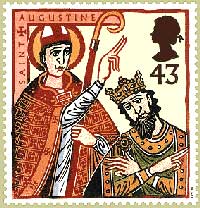 Chance meetings are important.
Chance meetings are important.
In the traditional Roman calendar, today is the Feast of St. Augustine of Canterbury (+604). He had been the prior of the monastery in Rome on the Caelian Hill during the pontificate of the Great Gregory I. In the Novus Ordo he is celebrated on 27 May, though he probably died on 26 May.
As the story goes, one day Pope Gregory spotted some English boys in the Roman slave market and was struck by their appearance, saying “Non sunt Angli sed angeli.” Moved to compassion, he tasked Augustine to go to England with missionaries in an effort of “new evangelization”. England had once been Christian but the Faith had flagged. Gregory paved the way with letters and missives, but the task was daunting.
Augustine and his companions landed in Kent and began to work. They met with King Ethelbert and Queen Bertha and the rest is history.
My congratulations to my good friends Fr. Timothy Finigan, His Hermeneuticalness, who is a parish priest close to the place when Augustine set foot in England, Margate, and to Fr. Marcus Holden, who is rector of the Shrine of St Augustine, Ramsgate.
Chance meetings can be occasions of grace not just for one or two, but for nations.
Today we need to pray and make reparation for entire nations, lest they be – as Our Lady said – “annihilated”.


































King Ethelbert and Queen Bertha are also saints. Queen Bertha was already Christian when she married Ethelbert. The still-pagan Ethelbert met Augustine of Canterbury under an oak tree as a precaution against any spells Augustine might try to cast. Upon listening to Augustine explain his mission, Ethelbert gave him permission to convert as many of his people as he could. The following year, he himself accepted Baptism. King St. Ethelbert should also be close to the hearts of lawyers, since, in addition to paving the way for Christianity, he also gave England her first written legal code.
Bede’s whole story is worth quoting for the two other clever papal puns:
We are told that one day some merchants who had recently arrived in Rome displayed their many wares in the crowded market-place. Among other merchandise Gregory saw some boys exposed for sale. These had fair complexions, fine-cut features, and fair hair. Looking at them with interest, he enquired what country and race they came from. ‘They come from Britain,’ he was told, ‘where all the people have this appearance.’ He then asked whether the people were Christians, or
whether they were still ignorant heathens. ‘They are pagans,’ he was informed. ‘Alas!’ said Gregory with a heartfelt sigh: ‘how sad that such handsome folk are still in the grasp of the Author of darkness, and that faces of such beauty conceal minds ignorant of God’s grace! What is the name of this race?’ ‘They are called Angles,’ he was told. ‘That is appropriate,’ he said, ‘for they have angelic faces, and it is right that they should become fellow-heirs with the angels in heaven. And what is the name of their Province?’ ‘Deira,’ was the answer. ‘Good. They shall indeed be saved from wrath [Latin “de ira”] and called to the mercy of Christ. And what is the name of their king?’ he asked. ‘Aella’, he was told. ‘Then must Alleluia be sung to the praise of God our Creator in their land,’ said Gregory, making play on the name.